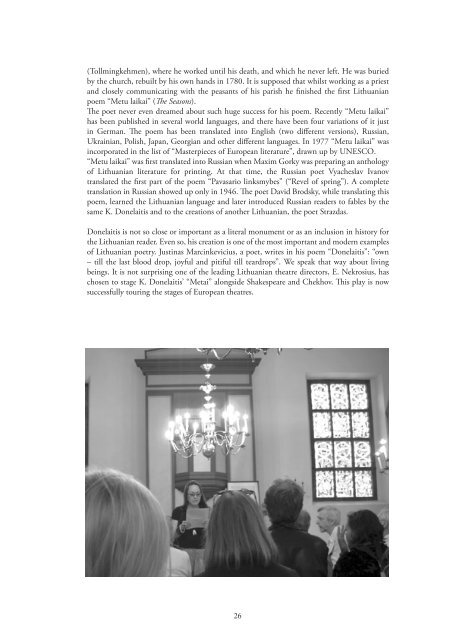BALTIC MEETINGS - Baltic Writers Council
BALTIC MEETINGS - Baltic Writers Council
BALTIC MEETINGS - Baltic Writers Council
Create successful ePaper yourself
Turn your PDF publications into a flip-book with our unique Google optimized e-Paper software.
(Tollmingkehmen), where he worked until his death, and which he never left. He was buried<br />
by the church, rebuilt by his own hands in 1780. It is supposed that whilst working as a priest<br />
and closely communicating with the peasants of his parish he finished the first Lithuanian<br />
poem “Metu laikai” (e Seasons).<br />
e poet never even dreamed about such huge success for his poem. Recently “Metu laikai”<br />
has been published in several world languages, and there have been four variations of it just<br />
in German. e poem has been translated into English (two different versions), Russian,<br />
Ukrainian, Polish, Japan, Georgian and other different languages. In 1977 “Metu laikai” was<br />
incorporated in the list of “Masterpieces of European literature”, drawn up by UNESCO.<br />
“Metu laikai” was first translated into Russian when Maxim Gorky was preparing an anthology<br />
of Lithuanian literature for printing. At that time, the Russian poet Vyacheslav Ivanov<br />
translated the first part of the poem “Pavasario linksmybes” (“Revel of spring”). A complete<br />
translation in Russian showed up only in 1946. e poet David Brodsky, while translating this<br />
poem, learned the Lithuanian language and later introduced Russian readers to fables by the<br />
same K. Donelaitis and to the creations of another Lithuanian, the poet Strazdas.<br />
Donelaitis is not so close or important as a literal monument or as an inclusion in history for<br />
the Lithuanian reader. Even so, his creation is one of the most important and modern examples<br />
of Lithuanian poetry. Justinas Marcinkevicius, a poet, writes in his poem “Donelaitis”: “own<br />
– till the last blood drop, joyful and pitiful till teardrops”. We speak that way about living<br />
beings. It is not surprising one of the leading Lithuanian theatre directors, E. Nekrosius, has<br />
chosen to stage K. Donelaitis’ “Metai” alongside Shakespeare and Chekhov. is play is now<br />
successfully touring the stages of European theatres.<br />
26


